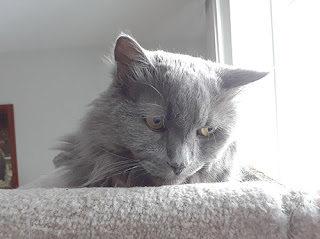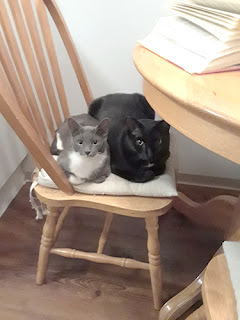As I have already related, Neville’s
use of ProZinc insulin, rather than the glargine, has been a failure. While it
gave him a couple of good ‘curves’ two days out of the last ten or so, that is
of course not enough, and cannot be depended upon to give him good health.
Furthermore, the sensor, which was to operate for two weeks, ceased working
Saturday morning. I initially thought there was a problem with the sensor
itself but, in fact, it was due to the device coming off of Neville, the little
prong on the its under-side no longer penetrating his skin. The first sensor
was glued rather too strongly to the Nevsky, and had taken off all his fur
underneath when it was taken off. I think to preclude a recurrence, this second
device was adhered deliberately less strongly. Even so, it did its job for the
time it was attached to my furry grey friend; it told me what I needed to know.
And Nev won’t have to go to the hospital once more for the sensor’s removal.
Pondering this led to other
thoughts, not directly connected to Neville and his diabetes. There was a time
when I was what one might have called a pessimist. Then again, there was a time
when I was young. I suspect that, in my immature state, I fancied that being
pessimistic gave me a certain cachet. I also suspect that, if it did, it was
entirely in my own mind, and everyone else found my attitudes tiresome and
dull. I myself think the past me deserved a good smack, followed by more, until
I was rendered unconscious and of no further annoyance to the general
population.
As I aged, I became more
optimistic. This is strange, considering I find the world having become worse
during the same time period. Nonetheless, I am now an optimist. This made me in
turn recall a movie I saw lo, these many years ago.
It was called Mr Patman, also known as Crossover.
Don’t be surprised if you’ve never heard of it. It was a Canadian film from
1980, which pretty much guarantees its anonymity. Besides which, 1980 was the
height of the Canadian film industry’s tax-shelter period, when terrible movies
were made by incompetent people for financial reasons. Thank goodness those
days are long gone and our film and television industries has thrived for more
integral reasons. Some good features were nonetheless produced and, to be
honest, I don’t remember if I liked Mr
Patman. Most of those who reviewed it – and acted in it – did not.
Just in case you are about to
watch Mr Patman, I will warn you that
I am about to spoil the ending for you; if you don’t want that, skip to my last
paragraph… The story involved a male nurse, portrayed by James Coburn (who was
never incompetent or terrible at his job), working at a psychiatric hospital.
He realises that, like the inmates, he is beginning to lose his sanity, and he
eventually checks himself into his own asylum.
Early in the film, he is
conversing with an inmate, with whom he is friends. The inmate explains that
there are two kinds of people in the facility. Some are optimists, others are pessimists.
The former eventually get better and leave; the latter do not.
At the film’s end, Patman, now a
patient, is welcomed to his new home by his friend, the inmate. They must choose
a bed for Patman, and the inmate suggests Mr So-and-So’s bed, as he won’t be
needing it anymore.
“What happened to Mr So-and-so?”
asks Patman.
“Oh, he was an optimist,” the
inmate answers.
Then, with a big and toothy grin,
the likes of which was unique to James Coburn, Patman tosses his bag on to the
bed and declares, “Then that’s the place for me!”
I have found that optimists may
not always be right in their view of life. They tend not to have fewer troubles
because of their attitudes; they probably don’t even have more friends. But I
think they find more to enjoy; there is more sunshine, and if there is rain,
they like the sound and smell of it. Optimists tend to smile more, I think,
because even if pessimists are right, what they are right about brings them no
joy. And, I believe, when events are conspiring to lock one away with lunatics,
optimists will get out of the asylum sooner.



























